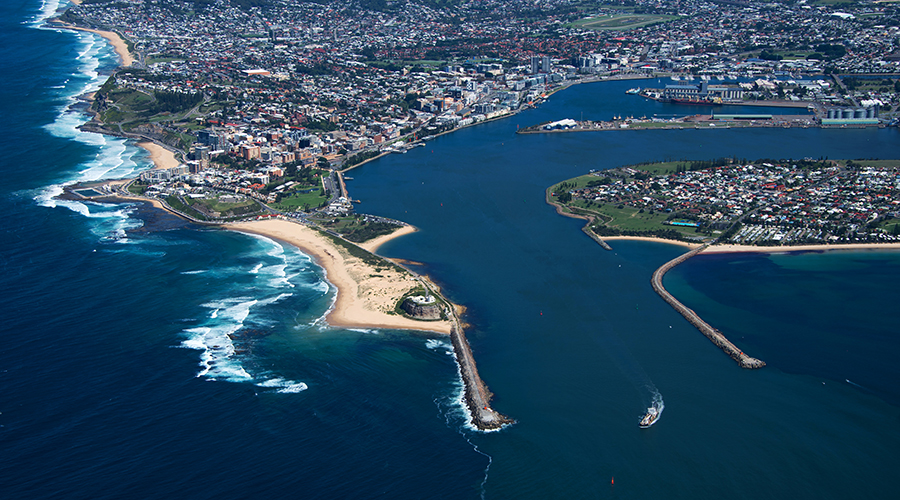
Port of Newcastle today published a report measuring the organisation’s progress in achieving its sustainability commitments.
Jackie Spiteri, Port of Newcastle’s Environment, Planning and Sustainability Manager, said the 2019 Sustainability Report examined the Port’s contribution towards the social, economic and environmental wellbeing of the Hunter and regional New South Wales (NSW).
“Minimising our environmental footprint, diversifying trade and creating a more resilient economy requires a determined, long-term effort, with co-operation between the Port and its stakeholders,” Ms Spiteri said.
“There are things we can do today to make the way we operate the port more sustainable and responsible – that is our immediate focus as we pursue our long-term diversification plans.
“I’m very proud of the progress Port of Newcastle has made so far, especially of our efforts to improve energy consumption and reduce our carbon footprint.
“Every tonne of CO2 reduced or any scale of operational efficiency we achieve will contribute to better outcomes for the future and have a positive cumulative effect that leads to significant, long-lasting results.”
Ms Spiteri said the report focused on achievements in relation to four key themes: Our People, Our Planet, Our Prosperity and Our Partnerships.
Highlights of the 2019 Sustainability Report
Our Planet
- Reduced operational “Scope 2” carbon emissions from electricity consumption in 2019 from 2018 baseline emissions
- The first port in Australia and New Zealand to be accredited under EcoPort’s Ports Environmental Review System (PERS), by meeting stringent environmental performance criteria
- The Port is now offsetting greenhouse gas emissions for all international and domestic corporate flights, through a partnership with Greenfleet, a leading not-for-profit environmental organisation. The initial contribution offset 208 tonnes of CO2-e, generated as part of corporate flights between January 2018 and September 2019, through the planting of approximately 775 native trees to establish a biodiverse forest
Our People
- Transforming what has traditionally been a male-dominated industry, 16 women were appointed to roles at Port of Newcastle, out of 21 recruitments in 2019
- Port of Newcastle established an Employee Engagement Forum made up of staff representatives from across the business. This group raises issues on behalf of the workforce and collaborates with the Executive Leadership Team to address those issues
- Looking beyond the safety of staff and taking into consideration the wellbeing of its people, Port of Newcastle introduced a Mental Health First Aid program. Employees who participated in the two-day training program are now better able to support the mental wellbeing of their peers should the need arise
Our Partnerships
- To assist City of Newcastle and the NSW Office of Environment and Heritage, Port of Newcastle placed 28.5 tonnes of clean sand dredged from the channel offshore Stockton Beach to help with the response to coastal erosion
- Port of Newcastle partnered with Newcastle-based local charity Dress for Success to procure much needed office supplies and to trial the delivery of a new career support program for women in need
Our Prosperity
- 4,600 vessel movements
- 171 million tonnes of trade worth $25 billion to the NSW economy
- Continued implementation of an ambitious diversification strategy that will utilise the full capacity of assets to increase existing trade and establish new, efficient and cost-effective supply chains.
About Port of Newcastle’s sustainability commitments
In driving long term value creation for the Hunter Region and New South Wales, sustainability is at the core of Port of Newcastle’s business strategy and culture. As part of its sustainability framework, Port of Newcastle is focused on:
- improving and growing existing supply chains and diversifying trade to ensure continued economic growth for the Hunter Region and NSW;
- minimising and offsetting the Port’s environmental footprint, as well as maintaining the status of being the world’s largest energy port by supporting the global movement towards the use of renewable energy;
- partnering with our employees, customers and community on initiatives that ensure the Port continues to support thriving, prosperous communities for generations to come.
Read more about the Port’s sustainability commitments.
Sustainability initiatives in 2020
As the Port continues to embed sustainability principles across its operations, it is also pursuing a diverse range of initiatives to create sustainable social, environmental and economic benefits for the Hunter and NSW. In 2020, some of these include:
- Launch of a new STEM scholarship program for Aboriginal students, in partnership with University of Newcastle
- Port operations to be powered by 100% renewable energy by 2021
- Transition entire vehicle fleet to electric vehicles (EV) by 2023, including the purchase of four EVs in 2020
- Continued efforts to progress diversification projects such as the Multi-purpose Deepwater Terminal, the Newcastle GasDock development and the growth of existing diversified trade
- Continued programming to promote the empowerment of women in maritime and provide equal opportunities for leadership positions
Port of Newcastle
Port of Newcastle is a major Australian trade gateway handling 4,600 ship movements and 171 million tonnes of cargo each year. With its annual trade worth about $25 billion to the New South Wales economy, the Port enables businesses across the state to successfully compete in international markets. With a deepwater shipping channel operating at 50% of its capacity, significant port land available and enviable access to national rail and road infrastructure, Port of Newcastle is positioned to further underpin the prosperity of the Hunter, NSW and Australia. As custodians of the region’s critical asset, Port of Newcastle is diversifying its trade as it strives to create a safe, sustainable and environmentally and socially responsible Port that realises its potential.
